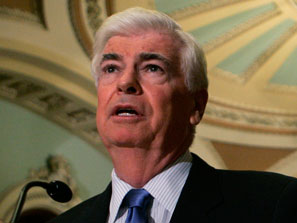
Senator Johnny Isakson, Georgia
One of my personal heroes in the national economic recovery and the associated housing recovery is Georgia Senator Johnny Isakson.
His early proposal for a $15,000 Home Buyer Tax Credit last February as a part of the original economic stimulus plan was right on target. In fact, I believe that, had Senator Isakson’s proposal become law, the housing recovery would be a lot further along than it currently is.
The half measure that eventually passed, the $8,000 First-Time Home Buyer Tax Credit, restricted only to first-time home Buyers, helped a little. But only a small sliver of the market.
And now, Senator Isakson is pressing again for a variation of his original proposal: a $15,000 Home Buyer Tax Credit that applies to almost everyone. (You can read the fine print on his website: http://isakson.senate.gov/)
However, his new proposal has one major flaw: He only proposes extending the program to June 30, 2010. The problem with this is that it typically takes 8-to-9 months from the date of contract to the date of completion to build a new single-family home. That means that almost nobody who wants to build a new home will qualify for the extended program. All the benefits will go to buyers of existing homes and builder spec homes.
And yet, new housing starts are one of the biggest drivers of new jobs. So anyway, I wrote my hero a letter explaining this problem. and here it is:
Dear Senator Isakson,
While I am not a resident of your state, I am a big fan of yours.
I am a small, custom homebuilder in Greensboro, NC. Your original $15,000 Tax Credit proposal for all home buyers last February was right on target, even brilliant!
If it had been enacted instead of the compromise, $8,000 first-time home buyer program, the housing industry would be a lot further along the road to recovery than it is today.
The reason for my writing is to alert you to a potential major flaw in your current proposal to extend the credit to June 30, 2010. (Please note that I bear you no disrespect. Quite the opposite – I want to help you avoid a potential major mistake by speaking candidly.)
Here is the flaw: Extending the program to June 30, 2010 as you suggest does not allow enough time for a prospective home buyer to buy a new home to be built. It typically takes 8-9 months from date of contract to date of completion to build a new home.
That means that if the tax credit were only extended to June, then virtually no new pre-sold or custom homes would qualify. And the tax credit would end up only applying to existing homes and completed builder spec inventory.
Many of the families currently stuck in move-up housing that you addressed in your recent statement on the Senate floor would be likely participants in new, upscale or custom homes. It would hurt those families to be excluded from the benefit of the tax credit, and, it would limit the impact on new housing starts, which is a major driver of new jobs.
I urge you to please reconsider the proposed extension date to allow one year to November or December 2010 in order to give people time to buy and build a new home. Such an extension would give them until April 2010 to buy their home and still get it completed in time.
Thank you again for speaking out on this important subject.
Respectfully yours,
Regis T. Skeehan
Managing Member
Piedmont Personal Builders, LLC





 The Mortgage Bankers Association (MBA) today released its survey for the week ending October 9, 2009. The average 30-year mortgage during the week was 5.02%, which was up 0.13% from the 4.89% reported one week earlier. These rates are still near historical lows.
The Mortgage Bankers Association (MBA) today released its survey for the week ending October 9, 2009. The average 30-year mortgage during the week was 5.02%, which was up 0.13% from the 4.89% reported one week earlier. These rates are still near historical lows. (Really! This is not a scam!)
(Really! This is not a scam!)
 is encouraging to home builders and prospective home buyers who believe the valuable incentive should be extended beyond its November 30, 2009 expiration date.
is encouraging to home builders and prospective home buyers who believe the valuable incentive should be extended beyond its November 30, 2009 expiration date.